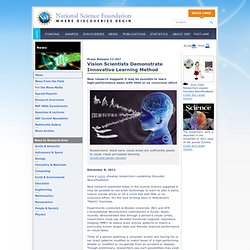

The Brain—Information about the Brain. 1 Introduction “I think, therefore I am.”

—René Descartes, 17th-century philosopher Few of us question the crucial importance of the brain. Perceptual Learning Incepted by Decoded fMRI Neurofeedback Without Stimulus Presentation. Vision Scientists Demonstrate Innovative Learning Method. Press Release 11-257 Vision Scientists Demonstrate Innovative Learning Method New research suggests it may be possible to learn high-performance tasks with little or no conscious effort December 8, 2011 View a video showing researchers explaining Decoded Neurofeedback.

New research published today in the journal Science suggests it may be possible to use brain technology to learn to play a piano, reduce mental stress or hit a curve ball with little or no conscious effort. Scientists say they're getting closer to Matrix-style instant learning.